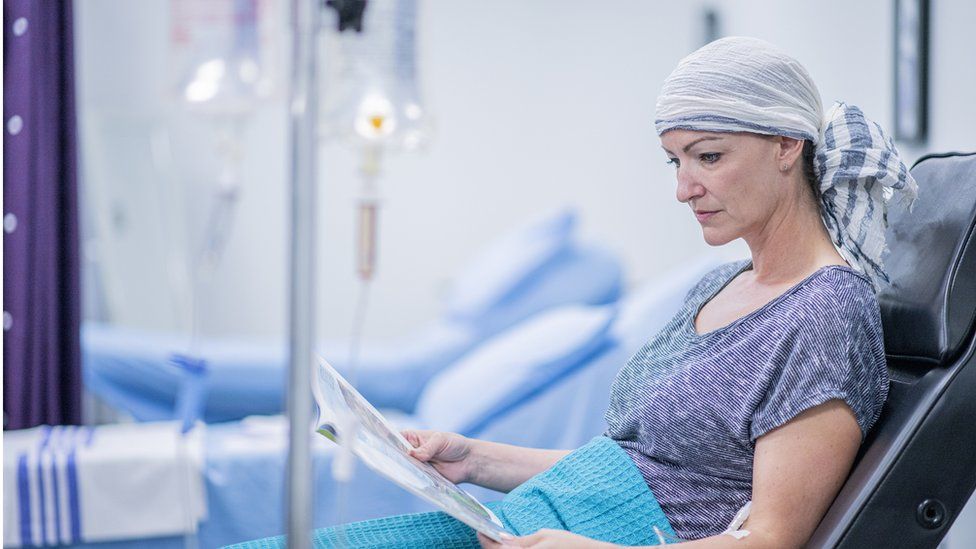Cancer patients 'lack same protection' after first jab
- Published
- comments

Cancer patients are much less protected against Covid-19 than other people after one dose of the Pfizer vaccine, the first real-world study in this area suggests.
With a 12-week wait for the second dose this could leave them vulnerable, says the King's College London and Francis Crick Institute research team.
An early second dose appeared to boost cancer patients' protection.
Cancer charities are calling for the vaccine strategy to be reviewed.
But Cancer Research UK said the small study had not yet been reviewed by other scientists and people undergoing cancer treatment should continue to follow the advice of their doctors.
The government said it was focused on "saving lives" and the antibody response "was only part of the protection provided by the vaccine".
"The independent Joint Committee on Vaccination and Immunisation (JCVI), which advises government on vaccine use and prioritisation, regularly reviews data and evidence on vaccine efficacy and effectiveness," it said.
About 1.2 million people at very high risk of being seriously ill with Covid-19 were prioritised for a first vaccine dose in the first phase of the UK rollout, which includes people with specific cancers.
The UK government decided to extend the gap between first and second jabs from three to 12 weeks in late December to give more people some protection as soon as possible.
Dr Sheeba Irshad, oncologist and senior study author from King's College London, said the findings were "really worrying" and recommended an urgent review of the timing of doses for people in clinically extremely vulnerable groups.
"Until then, it is important that cancer patients continue to observe all public health measures in place such as social distancing and shielding when attending hospitals, even after vaccination," she said.
The study, not yet published or peer-reviewed, recruited 205 people, including 151 with solid cancers, such as lung, breast and bowel, or blood cancers.
The researchers tested volunteers for antibodies and T-cells in their blood, which signals that the immune system can protect against illness from the virus in the future.
Three weeks after one dose of the Pfizer jab, an antibody response was found in:
- 39% of people with solid cancers
- 13% of people with blood cancer
- 97% of people with no cancer
Following a second dose three weeks after the first, which some cancer patients received, there was a sharp rise in their antibody response against the coronavirus, to 95%.
But among those who had to wait longer for their second dose, there was no real improvement in protection.
Five weeks after the first dose, an antibody response was detected in:
- 43% of people with solid cancers
- 8% of people with blood cancer
- 100% of people with no cancer
WATCH: Pfizer v Oxford v Moderna – three Covid-19 vaccines compared
In trials of the Pfizer vaccine, two doses were given three weeks apart and although a longer gap between doses works for healthy individuals, the researchers say cancer patients do not respond in the same way.
"One size does not fit all," said Dr Irshad.
"Cancer treatments have profound effects on the immune system and cancer patients' immune mechanisms are inferior.
"We need to be concerned about other vaccines for this population too - they do need a second dose quickly."
Dr Irshad also said leaving people unprotected for many weeks could give new variants the space to emerge and allow the virus to spread among family members caring for patients.
There are around 370,000 new cases of cancer in the UK every year, with up to three million people living with the disease.
People with compromised immune systems were not included in clinical trials of the vaccine, although previous studies suggested vaccines may not work as well in this specific group.
'Follow doctors' advice'
Cancer Research UK said the small study was "interesting" but there could still be limitations with the results.
Martin Ledwick, the charity's head information nurse, said: "We know that this information could be worrying, but anyone undergoing cancer treatment should continue to follow the advice of their doctors, and we encourage all who can to take up the vaccine."
Breast Cancer Now has called on the UK's vaccine committee, the JCVI, to "urgently review the evidence presented in this study and consider adapting its strategy" to give people with cancer both doses within three weeks.
Blood Cancer UK echoed this call, saying more research was needed urgently so that people don't "face a future of shielding indefinitely, not knowing whether they are protected". They added that blood cancer patients should still definitely have the vaccine.
Prof Stephen Evans, professor of pharmaco-epidemiology, from London School of Hygiene & Tropical Medicine, said: "These data will undoubtedly need to be examined by JCVI, but the evidence that harm has been caused to patients with cancer by delaying a second dose has not yet been demonstrated conclusively.
"Full follow-up of those who get vaccinated with a delayed second dose will be very important."
The study will continue to follow cancer patients after their vaccinations for up to six months.
- Published16 April
- Published8 December 2020
- Published18 January 2021
- Published18 November 2020
- Published9 November 2020